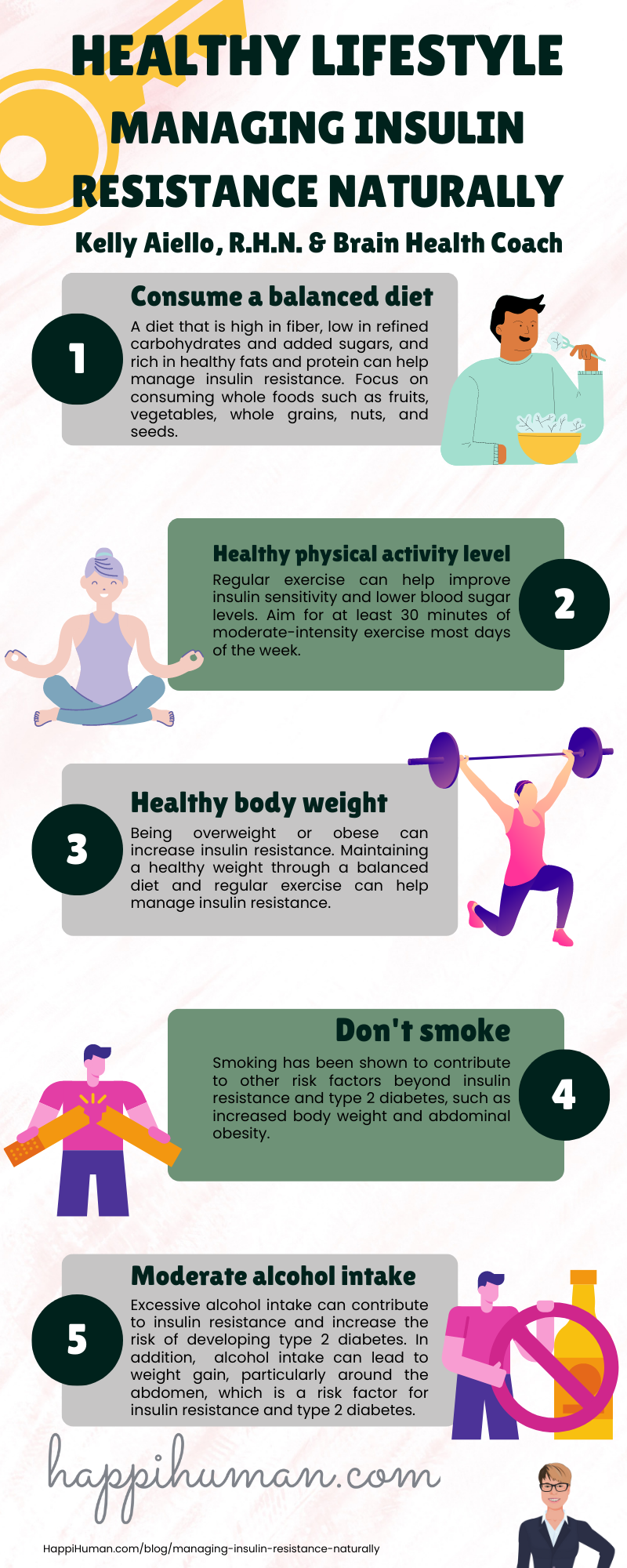Managing Insulin Resistance Naturally
Insulin resistance is a growing concern in the health space.
If you know about it and its effects then you know how serious a condition it can be. If not, you should make yourself aware.
Regardless of which camp you currently find yourself in, do yourself a favour and keep reading as we discuss what insulin resistance is, who is at risk, and what you can do about it.
What is insulin resistance?
Insulin resistance is a condition that occurs when the body doesn’t respond to insulin as it should. It is a metabolic disorder that results when cells in your body become resistant to the effects of insulin, a hormone that helps your body use glucose for energy.
Insulin allows glucose to enter cells through specific receptors on their surface. When you have insulin resistance, your body needs more insulin to help glucose get into cells - so it secretes more of this hormone than usual (1).
When you eat, your pancreas naturally releases insulin into the bloodstream, telling your cells to absorb glucose and use it for energy.
But when you don’t have enough insulin in circulation or your cells become resistant to its effects, this process breaks down. Excess glucose is allowed to build up in the blood instead of being used as fuel.
At first glance, this might seem like an innocent enough occurrence. After all, it’s not uncommon for an individual with Type 2 diabetes or pre-diabetes (2) to experience higher-than-average blood sugar levels due to increased insulin production and decreased sensitivity to it (3). But while high levels may cause no immediate problems in healthy individuals with good diets and exercise habits, or those who are overweight but still active, they can eventually lead to problems.
Over time, the build-up of glucose in the blood can lead to pre-diabetes or type 2 diabetes. It can also make you more prone to other health problems like heart disease or high blood pressure. Excess glucose in the blood will also make weight loss and inflammation management that much harder, if not impossible.
Fortunately, there are many steps you can take to help prevent insulin resistance. Plus, it’s possible to reverse some of its effects if it’s already happening!
You may also like
Thank you Kelly for explaining, teaching and motivating me on managing my Type II Diabetes. Your meal plans helped tremendously, but it was your patience with all my questions that made all the difference - you really wanted me healthy!!
—Leslie J. Ontario
Why Choose Me?
I never met a person that didn’t have some resistance to change. I take the time to get to know my clients fully, find their internal motivation and set them up for long-term success that’s personalized.
Who is susceptible to insulin resistance?
Though there is no single cause of Insulin resistance, many factors can contribute to its arise. Overeating and having excess body fat, especially in the abdominal area, are common reasons why someone may develop insulin resistance.
Other factors that can contribute include a high-sugar diet, chronic inflammation, chronic stress, excess fructose consumption, lack of exercise, lack of regenerative sleep, and eating too often without giving your system a break, as in the case of chronic snackers or those who eat all day long.
Genetics can also trigger insulin resistance.
Some people are genetically predisposed to developing insulin resistance because their genes make their cells more sensitive to insulin over time. This means those individuals will need less insulin for their bodies to function normally. However, this increased sensitivity to insulin may lead to type 2 diabetes if left untreated. Sometimes, they may still develop diabetes, even if their insulin resistance is treated appropriately!
So it’s essential for those genetically predisposed to insulin resistance to carefully manage their blood sugar levels - not only because they are at a higher risk but also because symptoms may not arise until they are in the later stages of the disease. Treatment becomes much more challenging at this point due to damage already done by high blood sugar levels left out of check for years.
A final note on genetics here - its important to know that just because someone may be genetically predisposed to a condition, whether insulin resistance, high blood pressure, cancer, or Alzheimer’s, diagnosis is not a guarantee. By properly managing their diet, lifestyle, and environmental factors, they can control whether or not the gene coded for a specific disease or outcome gets turned on or stays turned off. The science of how environmental influences affect the way our genes express themselves is referred to as epigenetics.
Hunger and the immune system
Another consideration is what happens when you are hungry.
When hunger strikes, your body releases more insulin to help glucose be absorbed. Because glucose is the body’s primary energy source, when it is absorbed during times of hunger (or starvation), your body will have the energy to carry on.
Glucose is also used to make new body cells and is stored in the liver and muscles as glycogen (a form of carbohydrate storage). Excess glucose is converted into fat if there isn’t enough room left in these storage areas. This process happens when we overeat carbohydrates or sugars over time. The liver and muscles absorb all the glucose they can, then any additional glucose gets moved into fat cells for storage, causing us to hold on to weight despite our best efforts.
Insulin resistance is called insulin “resistance” because our bodies become resistant to the effects of insulin on fat tissue when the tissues don’t respond well to it anymore.
Obesity and insulin resistance
Obesity and insulin resistance are tightly linked.
Obesity is a significant risk factor for insulin resistance, increasing your body’s ability to produce and store fat. The more fat you have, the harder it is for insulin to do its job properly.
The exact mechanisms by which obesity causes insulin resistance are not well understood but several factors may be involved:
High levels of circulating free fatty acids (FFAs) increase lipid accumulation in muscle cells and decrease glucose uptake by these cells.
Reduced sensitivity of muscle cells’ GLUT4 transporters (which transport glucose into cells) due to increased protein expression or activity that inhibits GLUT4 trafficking (e.g., PKC). This reduces glucose uptake into muscle cells even when enough circulating insulin exists. This phenomenon is called “glucose sparing” because other tissues, like fatty tissue, can take up more glucose instead of storing it as glycogen in skeletal muscle tissue.
So what can you do? If you have insulin resistance or are genetically predisposed to it, what actions can you take today to reverse it or prevent it from developing in the first place?
Follow these guidelines to help keep your insulin levels in check
Eat a diet low in sugar, refined carbs and saturated fat. These are the main culprits that cause insulin resistance, so you should avoid them as much as possible. Instead, focus on eating whole grains, fruits and vegetables.
Exercise regularly. Exercise is one of the best ways to improve insulin sensitivity because it helps your body use glucose more efficiently by improving muscle mass and blood flow through circulation. Even walking 30 minutes per day can start making a difference!
Get enough sleep. Sleep deprivation has been shown to increase levels of inflammatory markers like C-reactive protein (CRP) and stress hormones. Each of these factors will increase your risk for diabetes complications such as heart attack or stroke.
Conclusion
We’ve covered a lot of ground in this article, from the facts about insulin resistance to some of its causes and consequences.
It can be overwhelming to think about all that goes on in your body when you eat or don’t eat, but we hope these tips will help make it easier for you to manage your health and maintain a healthy lifestyle.
If not, and you’d like individual support or guidance, contact us to get started today!
[Medical Disclaimer]
Please consult with your doctor(s) before starting any new mental or physical health improvement program. The advice I offer is not intended to replace that of your medical practitioner. I am not a medical professional, nor am I qualified to diagnose, cure treat, or prevent disease. The advice I provide on this website is intended for a broad and diverse audience, and as such, deals with general lifestyle concepts, not specific healthcare advice. This material disclaims any liability or loss in connection with the advice expressed herein.















